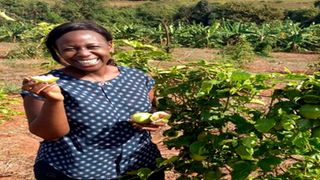
Caroline Muriithi, a horticultural farmer, is pictured in her farm at Ikurungu village in Mwea East, Kirinyaga County.
| Sammy Waweru | Nation Media GroupSeeds of Gold
Premium
Juicy returns from fruits side hustle
What you need to know:
- Caroline, who hopes to break even next year, intercrops bananas with beans and cowpeas, with the two acting as cover crops.
Sometime in 2019, Caroline Muriithi thought of running a side hustle that would earn her some money.
The side hustle, the public health officer figured out, should also work as her retirement plan. After scouting around for a business, she opted to engage in farming.
“My parents farmed bananas and other crops in Kirinyaga County where I come from besides being employed. Having helped on the farm, I was confident to start my own,” says the 43-year-old.
She shared the idea with her husband, Dr Patrick Muriithi, and the couple agreed to purchase five acres at Sh1.6 million in South Ngariama, Mwea East for the business.
The land is next to River Thiba, a reliable source of water, what even made it easier for her to farm.
“My first crop was maize and beans in which I invested Sh50,000. Ngariama has fertile soils and the temperatures are favourable thus crops mature faster,” she says.
But weeks to harvesting, Caroline says heavy rains swept away her beans.
“It did not help that the farm sits on a slope with part of it bordering the river. I lost all my beans, but for maize, I was able to harvest some and sell the produce to earn Sh38,000.”
Expert advice
Later, she engaged an agriculturalist who advised her to plant trees on the border with the river and establish an orchard.
“I planted bamboos, this is a long-term investment,” she says.
Her fruit farm currently hosts a variety of bananas including plantains, Grand Nain, Cavendish, sweet bananas and Williams, which sit on two-and-half acres. The farmer also grows pawpaw on an acre, yellow passion fruits and Hass avocados.
“I have about 100 Solo sunrise papaya trees and over 80 passion fruits plants,” explains the mother of three who works in Nairobi. She sells a kilo of pawpaw at Sh60 while yellow passion fruits go for between Sh80-Sh150. Other crops on the farm are macadamia, the bamboo trees and grevillea, which act as windbreakers.
“Avocados are my latest fruit trees. I planted 85 pieces but I am yet to start harvesting,” says Caroline, who holds a Master’s in Public Health.

Caroline Muriithi, a horticultural farmer, is pictured in her farm at Ikurungu village in Mwea East, Kirinyaga County.
She visits the farm twice a month and during the rest of the period, she is in constant communication with her worker. “The crops too don’t require constant supervision, what makes it easier for me.”
She harvests up to 50 bunches of bananas every two weeks and sells for Sh600 to wholesalers from Kirinyaga and Nairobi, most who come through referrals. She also sells in kilos, each going for Sh15. On the other hand, she harvests about 60 to 100 kilos of pawpaws per week, with each going for Sh60.
For passion fruits, she has had two harvests so far, getting over 50 kilos per harvest and selling each at Sh150.So, what’s her advice to those working fulltime and would want to venture into farming?
“Don’t focus on crops that require constant supervision. Get reliable and responsible worker(s) who can make good decisions. Have passion for the venture and research more on what is needed.”
Caroline, who hopes to break even next year, intercrops bananas with beans and cowpeas, with the two acting as cover crops.
“The ground cover crops control weeds and surface runoff, as well as reduce water loss,” says Daniel Mwenda, an agriculturalist with Mwenda D Agroforestry Solutions.
The farmer uses organic farming practices that include growing pest repellent crops such as bulb and spring onions in between the fruit trees. She uses manure from her 50 chickens, eight goats and a cow to grow her crops.
But it is not all rosy. During the rainy season, reaching the farm and transporting produce to the market is a big problem, says Caroline, who has employed a farm manager and contracts casuals when need arises.





